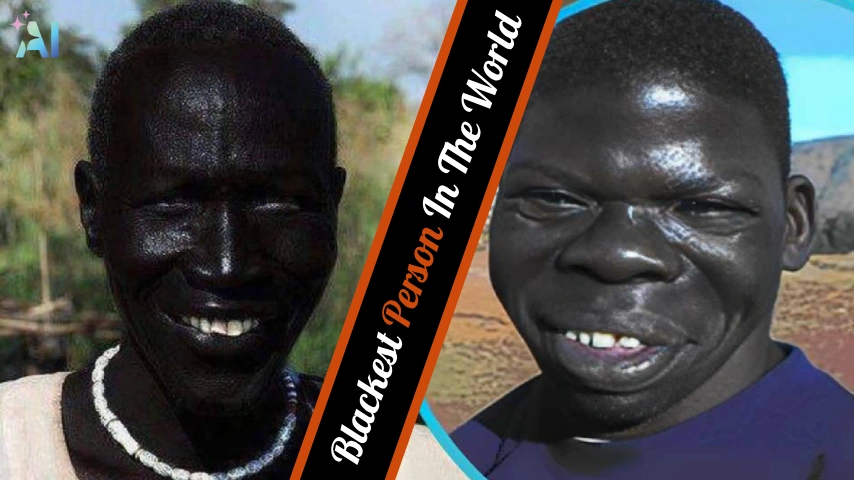The concept of the “blackest person in the world” has sparked curiosity and debate, but it’s not as straightforward as you might think. There’s no official measurement or record for the darkest skin tone. Instead, we’ll explore some of the individuals known for their strikingly dark complexions and the broader context surrounding skin pigmentation.
Who is Considered the Blackest Person in the World?
While there’s no definitive answer, two models have gained recognition for their exceptionally dark skin:
1. Nyakim Gatwech
Nyakim Gatwech, a South Sudanese-American model, has captured global attention with her deep, ebony skin tone. Born on January 27, 1993, she’s now 31 years old (as of 2024) and resides in Minnesota, USA. Fans have dubbed her the “Queen of Dark,” a title she wears with pride.
Gatwech’s journey hasn’t been easy. She faced bullying and discrimination due to her skin color, but she’s turned those challenges into a platform for empowerment. Now, she’s a successful model and advocate for self-love and acceptance.
2. Khoudia Diop
Another model celebrated for her dark complexion is Khoudia Diop. Born on December 31, 1996, in Senegal, she’s 26 years old (as of 2023) and currently based in New York City. Diop has embraced the nickname “Melanin Goddess,” which perfectly captures her stunning appearance.
Like Gatwech, Diop has overcome bullying and negative comments about her skin tone. She’s now a rising star in the fashion world, using her platform to challenge beauty standards and inspire others to love their unique features.
What About the Darkest Man?
You might have seen a viral image of an unidentified African man with incredibly dark skin. While the photo has circulated widely online, there’s no verified information about his identity or origin. It’s a reminder that extraordinary features can capture our attention, but it’s important to approach such claims with caution.
Is There a Guinness World Record?
Despite what you might have heard, there’s no official Guinness World Record for the darkest skin tone. Rumors have circulated that Nyakim Gatwech holds such a record, but these claims are false. In fact, Guinness World Records doesn’t monitor or measure skin tone at all.
How is Skin Darkness Determined?
Skin darkness is primarily determined by the amount of melanin in a person’s skin. Melanin is a pigment that gives color to our skin, hair, and eyes. People with darker skin have higher levels of melanin, especially a type called eumelanin.
But here’s the catch: there’s no standardized scale to measure skin darkness. It’s mostly a subjective assessment based on visual appearance. This lack of an official measurement system is one reason why claims about the “blackest person” are difficult to verify.
Where Are the Darkest-Skinned People Found?
While dark skin can be found in many parts of the world, some regions are known for having populations with particularly deep skin tones:
- South Sudan
- Melanesia (a region in the South Pacific)
- Papua New Guinea
- Parts of Africa close to the equator
These areas typically have intense sunlight year-round, which has led to the evolution of darker skin as a natural protection against UV radiation.
What Challenges Do Dark-Skinned Individuals Face?
Unfortunately, people with very dark skin often face unique challenges:
- Bullying and discrimination: Prejudice based on skin color remains a global issue.
- Colorism: This form of discrimination occurs even within communities of color, where lighter skin is sometimes favored over darker tones.
- Pressure to conform: Many dark-skinned individuals feel pressure to lighten their skin to fit Western beauty standards.
These challenges highlight the importance of representation and education to combat harmful stereotypes and promote inclusivity.
How Has the Perception of Dark Skin Changed?
The perception of dark skin has evolved significantly over time:
Past
In the past, dark skin was often:
- Associated with inferiority due to racist ideologies
- Subject to widespread discrimination in many societies
Present
Today, there’s a growing appreciation for dark skin:
- Increasing celebration of diverse beauty standards
- More representation in fashion, media, and entertainment
While progress has been made, it’s important to recognize that challenges still exist, and there’s more work to be done to achieve true equality and appreciation for all skin tones.
Which Industries Embrace Dark-Skinned Individuals?
Several industries have begun to recognize and celebrate dark-skinned individuals:
- Fashion modeling: Dark-skinned models are increasingly featured in high-profile campaigns and runway shows.
- Beauty and cosmetics: Brands are expanding their product ranges to cater to darker skin tones.
- Entertainment: Film, TV, and music industries are slowly improving representation of dark-skinned performers.
Comparison Table: Notable Dark-Skinned Models
| Model | Origin | Known For |
|---|---|---|
| Nyakim Gatwech | South Sudan | “Queen of Dark” |
| Khoudia Diop | Senegal | “Melanin Goddess” |
| Alek Wek | South Sudan | Pioneer in 1990s fashion |
| Duckie Thot | Australia (South Sudanese descent) | “Living doll” appearance |
| Adut Akech | South Sudan/Australia | High fashion runways |
These models have not only achieved success in their careers but have also become important figures in challenging traditional beauty standards.
What Are the Benefits of Dark Skin?
Dark skin isn’t just beautiful – it also comes with some natural advantages:
- Better protection against UV radiation: Melanin acts as a natural sunscreen, reducing the risk of sun damage.
- Lower risk of skin cancer: The extra protection from UV rays helps prevent DNA damage that can lead to skin cancer.
- Slower visible aging: Dark skin tends to show fewer signs of aging, like wrinkles and age spots, compared to lighter skin.
These benefits highlight why diversity in skin tones is not just about aesthetics, but also about the amazing adaptations of the human body.
How Do Dark-Skinned Models Impact the Fashion Industry?
The increasing presence of dark-skinned models in fashion is making waves:
- Challenging traditional beauty standards: By showcasing diverse skin tones, these models are expanding the definition of beauty.
- Increasing diversity in campaigns and runways: Fashion brands are slowly recognizing the importance of representing a wider range of skin tones.
- Inspiring confidence: Seeing successful dark-skinned models can boost self-esteem among individuals who may have felt underrepresented.
This shift is not just about fashion – it’s about changing societal perceptions and promoting inclusivity on a broader scale.
Conclusion
While we can’t definitively name the “blackest person in the world,” individuals like Nyakim Gatwech and Khoudia Diop have brought attention to the beauty of dark skin. Their success challenges long-standing beauty norms and promotes a more inclusive vision of attractiveness.
The concept of skin tone is complex, influenced by genetics, geography, and societal perceptions. As we move forward, it’s crucial to celebrate the diversity of human appearance and work towards a world where all skin tones are equally valued and respected.
Remember, beauty comes in all shades – and that’s what makes humanity truly fascinating and beautiful.




